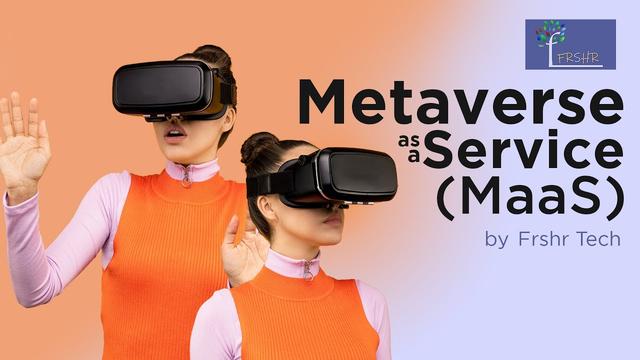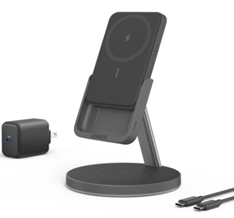Software as a Service or SaaS refers to a subscription-based model for using software platforms rather than purchasing a lifetime or perpetual license. The term first appeared in a 1985 United States Patent and Trademark Office (USPTO) filing and became popular in the cloud era.
Today, nearly everything can be deployed on an ‘as-a-Service’ model, providing customers with greater flexibility and vendors with a steady stream of revenues. Firms could eventually deploy the Metaverse using a similar model, giving rise to Metaverse-as-a-Service, or MaaS.
Defining the Metaverse
The Metaverse refers to a network of interconnected 3D virtual worlds that allow users to participate in a life-like social economy. You can buy and sell things, earn money, make friends, build brands, and collaborate with your colleagues on the spatial communications platform.
The metaverse is envisioned as a decentralized space built with blockchain architecture so that no single entity can control it. In other words, it tries to recreate the democratic nature of the real world in a digital space.
The term Metaverse was first used by author Neal Stephenson in his 1992 novel Snow Crash. It gradually gained popularity in the technology world with the rise of multiplayer world-building games such as Second Life, Minecraft, and Roblox.
Decentraland further expanded the concept by launching a metaverse platform that allowed users to trade in its own cryptocurrency, MANA, which would enable the purchase of real estate and digital assets in VR.
Facebook further promoted the Metaverse as a revolutionary tech force after it rebranded as Meta Platforms in 2020 and announced that it would invest $50 million in its development.
As more companies like Microsoft, Samsung, NVIDIA, HTC, and others venture into the Metaverse segment, it is only a matter of time until markets have a Metaverse-as-a-Service (MaaS) offering allowing companies to profit from the technology with fewer barriers to entry.
What Is MaaS?
MaaS is defined as an enterprise solution that allows organizations to develop and strengthen their presence in a 3D virtual world in order to support collaboration, business processes, investments, cryptocurrency, and other related use cases.
Importantly, MaaS will not help companies build their own Metaverse equivalents that compete with Decentraland or Roblox, but will instead allow companies to gain from existing Metaverse infrastructure, similarly to how SaaS operates.
Despite being an emerging technology segment, there are already a number of providers making inroads into MaaS:

Examples of Metaverse as a ServiceLovelace World
Lovelace is a cryptocurrency and NFT platform that announced a MaaS offering in October 2021. The company already operates its own cryptocurrency token called LACE and intends to offer MaaS services to streamline Metaverse adoption.
The company will help organizations assess and reimagine their VR product and service capabilities so that companies can participate across all realms.
It offers a MaaS toolkit that provides developers and users with the technologies necessary to create and trade NFTs, operate smart contracts, monetize VR gaming, integrate with other metaverse platforms, and much more.
Propel MaaS
Propel is a blockchain solutions platform that offers plug-and-play infrastructure tools for the Metaverse. The company is new and full details are yet to be revealed, but Propel has announced that it will offer MaaS solutions for smart contracts, NFT utilities, and decentralized finance (DeFi).
It will equip organizations with end-to-end tech stacks to develop applications based on popular blockchain protocols like Ethereum, Polkadot, and Binance Smart Chain (BSC).
The company is currently conducting a funding round for its cryptocurrency token $PEL through an Initial Hot Cross Offering (IHO), which operates similarly to Initial Currency Offerings (ICOs).
Touchcast
Touchcast is a 3D and VR events company that leverages Microsoft Azure Cloud. It announced its MaaS offering at the Consumer Electronics Show (CES) 2022, where it launched MCity. Organizations can sign up for a .metaverse domain, which will provide them with a secure VR space to build metaverse campuses.
In the Metaverse, they can facilitate collaboration, hold events, build VR stores, conduct learning sessions, or use virtual real estate to drive business growth.
NVIDIA’s artificial intelligence (AI) technology, Epic Games’ Unreal Engine, Microsoft’s Azure Cloud, and Accenture’s services power the platform to provide enterprises with a complete MaaS offering. MCity is currently in an invite-only beta stage.
MetaVerseBooks
MetaVerseBooks is a MaaS provider that offers tools for VR world-building, NFTs, and decentralized application (dApp) management.
Companies can leverage the solution to strengthen their presence on Microsoft’s XBOX Metaverse, iOS and Android-based platforms, and any Unity-based VR environments.
Its primary solution enables NFTs so that companies can manage NFT buyers and related metadata. This MaaS offering is priced at $10,000 USD for the Starter edition.
Pros and Cons of Metaverse as a Service
There are several benefits of using MaaS:
Companies without extensive digital experience or expertise can develop Metaverse products. Even small to mid-sized businesses can participate in the Metaverse economy without formidable capital costs.
It encourages investment in what is still an experimental technology. Most platforms are still limited to consumer use cases and solutions like Meta’s Horizons’ suite of apps or Microsoft Mesh are yet to see widespread release. In this environment, MaaS allows companies to invest and gain from the technology with minimal risk.
Eventually, MaaS could drive standardization in the sector, with a few companies acting as Metaverse ‘brokers’ to help in infrastructure development.
The downside is that organizations could risk vendor lock-in. As the metaverse evolves, it will become increasingly difficult to port MaaS investments to another platform, if necessary, especially without the requisite digital skills. However, a ‘vendor lock-in’ degree of maturity is still years away, and for now, MaaS is a promising option for organizations looking to enter the Metaverse.









